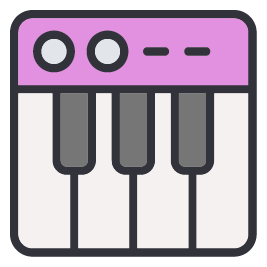When most people hear the word improvisation, they think of fast-fingered jazz pianists flying through chords in smoky clubs. And while jazz does thrive on improvisation, the art of creating music in the moment isn’t limited to one genre — or one type of musician. It’s something every pianist, regardless of style or level, can explore. In fact, it may be the key to unlocking a deeper connection with your instrument.
Improvisation = Freedom
For many classically trained pianists, music can start to feel rigid. There’s a score, a tempo, a tradition — and very little room to simply play. Improvisation offers a release from that structure. You’re not following a map; you’re drawing one as you go.
It’s a shift in mindset:
- From control to exploration
- From precision to curiosity
- From performance to play
And that shift can completely transform how you experience the piano.
It Strengthens Your Musical Mind
When you improvise, you’re not just moving your fingers — you’re activating your ears, your memory, your intuition. You begin to hear how melodies are shaped, how chords breathe, how rhythm speaks.
Improvisation sharpens:
- Ear training — You learn to recognize intervals, patterns, and harmonic changes by feel
- Memory — Instead of memorizing pieces note-for-note, you understand their inner structure
- Confidence — You trust your musical instincts instead of second-guessing them
Even just five minutes of improvisation a day can improve how you learn, how you listen, and how you connect with any piece of music.
It Helps You Find Your Voice
We spend so much time trying to play music correctly, that we sometimes forget to ask: what do I want to say through music?
Improvisation is a direct way to discover your own musical personality. There’s no script to follow — so what comes out is uniquely yours. It might be raw, messy, unpredictable. But it’s also honest.
Many students are surprised by how much they already know — when there’s no pressure, creativity begins to flow naturally. You begin to notice habits, patterns, and ideas that are entirely your own.
It’s Not About Being a Genius
You don’t need to be Keith Jarrett or Herbie Hancock to improvise. You just need curiosity. Some of the most meaningful musical moments come not from brilliance, but from boldness — from being willing to sit down and make something up.
Try starting small:
- One chord, one hand — and just listen
- Improvise with only black keys
- Copy the rhythm of your breath
- Build a simple phrase and repeat it with variations
These aren’t technical exercises — they’re invitations to play.
A Practice of Presence
Ultimately, improvisation is about presence. It’s about being where you are, listening closely, and responding in real time. It’s musical mindfulness.
And the beauty?
It’s always new.
Every session.
Every sound.
